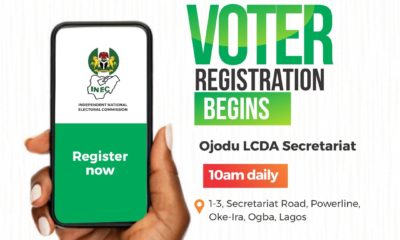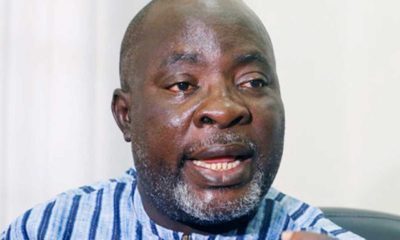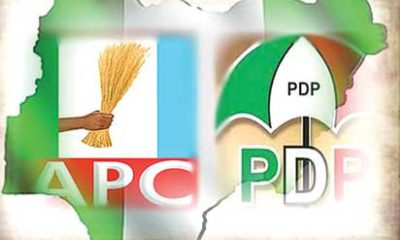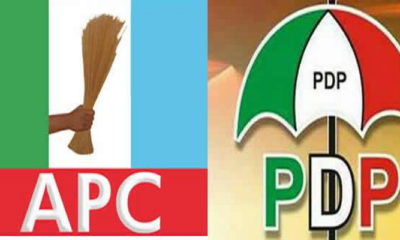News
Nigeria’s 2019 Elections: A Two-Horse Race With Uninspiring Candidates
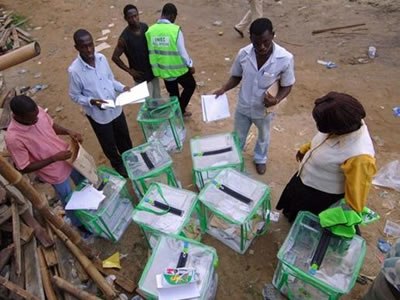
Eniola Olayemi
Ata Ndele’ is a popular song in Democratic Republic of Congo [DRC], which means, ‘[in the past] the day before yesterday [in the future] late, the day after tomorrow as late as possible always, continuance, eternity.’
In the last quarter of 2018, Madagascar and Democratic Republic of Congo [DRC] went to the polls to elect their new presidents. In Madagascar it was between Andry Rajoelina and Marc Ravalomanana. A close call election in which Andry Rajoelina won with a narrow margin of 55% of the election, earlier before the final announcement of the results, Marc Ravalomanana [Marc Ravalomanana received 44% of the votes cast] had cried foul over alleged rigging of the election by his opponent and the eventual winner, Andry Rajoelina.
It took the Madagascar’s High Constitutional Court to intervene and announced Andy Rajoelina as final winner of the Madagascar election in 2018. Following closely was the December 30th, 2018 election in Congo Democratic Republic between Martin Fayulu and son of the late, charismatic opposition leader Etienne Tshisekedi. Felix Tshisekedi won with 38.57 percent of more than 18 million ballots, while Martin Fayulu won 34.8 percent.
In a twist of fate it took Congo Democratic Republic Constitutional Court to affirm the elections late January 19th, 2019, in which the constitutional court affirmed that Felix Tshisekedi won the hotly contested election. The African Union and Catholic Church in Congo Democratic Republic has earlier called for a re-count of the election in Congo Democratic Republic, in what they termed; ‘unfair and compromised’ electoral process in the Congo Democratic Republic presidential election.
This is a carryover of the ‘Impossible Elections Pride’ in Africa into 2019. This is ‘theses of democratic elections in Africa. There are about 10 African countries with scheduled elections this year, namely; Nigeria – February, Senegal – February, Algeria – April, South Africa – May, Malawi – May, Mauritania – June, Mozambique – October, Botswana – October, Namibia – October, Tunisia – December.
The most interesting and exciting amongst these countries are; Nigeria and South-Africa. Nigeria with a population of an estimated 20 million people and the most populated black country on the planet with 84,271,832 registered voters to cast votes in the upcoming 2019 general elections in 120,000 polling units in 8,810 Wards in 774 Local Government Areas and 36 States and The Federal Capital Territory, Abuja.
With the incumbent President Muhammadu Buhari of All Progress Congress [APC] going out against 79 other presidential candidates on February 16th, 2019 election.
Nigeria Presidential election is scheduled for February 16th, 2019 in what observers dubbed the most expensive, most hotly contested and a cliff hanger in the nations political history! With 79 political parties out the 91 registered political parties fielding presidential candidates, February 16th, 2019 presidential election will go down in the anal of Nigeria political history as ‘Battle of Normandy’ replica.
A total of 20,000 candidates are contesting on various political parties platforms. 1,800 senatorial candidates vying to represent 109 senatorial districts, 2,600 House of Representatives candidates vying for the 360 federal constituencies’ seats, and 14,000 candidates vying for 991 state constituencies’ seats.
South Africa’s mid-year population is estimated to have increased to 57.73 million in 2018, representing an overall increase of 1.55% between 2017 and 2018. Gauteng continues to record the largest share of the population with approximately 14.7 million people [25.4%] living in the province.
South-Africa is Africa’s economic hub and power house and has the longest rail network in Africa and a member of BRICS economic bloc [Brazil, Russia, India China & South Africa]. South Africa is recovering from massive political corruption scandal that swallowed the former President Jacob Zuma out of office in February 14th, 2018 after intense pressure from his own party African National Congress [ANC] and the eventual sworn in of Cyril Ramaphosa. South Africa presently has a total number of 563 registered political parties contesting elections in 2019. Nigeria and South Africa will arguably be the ‘Impossible Africa’s Elections Pride’ In 2019.
South Africa will likely have an easy election ride taken into cognizance African National Congress [ANC] political dynasty and lineage in South Africa political landscape. Nigeria remains the ‘eyes’ of the world’ in the build up to the 2019 elections.
The much awaited ‘titanic’ presidential live debate between; President Muhammadu Buhari of All Progressive Congress [APC], Waziri Adamawa, Alhaji Atiku Abubakar of Peoples Democratic Party [PDP], Obiageli Ezekwesili of Allied Congress Party of Nigeria [ACPN], Kingsley Moghalu of Young Progressive Party [YPP] and Adetokunbo Olufela Durotoye Alliance for New Nigeria [ANN] took place on January 19th, 2019.
The proposed #LiveChat Presidential debate on January 19th, 2019 between Nigeria’s five presidential aspirants was ignored by both President Muhammadu Buhari of All Progressive Congress [APC] and his closest challenger, former Nigeria’s Vice President, Atiku Abubakar of Peoples Democratic Party [PDP]. The #LiveChat Presidential debate was attended by only three, namely; Oby Ezekwesili of Allied Congress Party of Nigeria [ACPN], Adetokunbo Olufela Durotoye of Alliance for New Nigeria [ANN] and Kingsley Moghalu of Young Progressive Party [YPP].
The sudden withdrawal of Obiageli Ezekwesikli the presidential candidate of Allied Congress Party of Nigeria [ACPN] from the February 16th, 2019 presidential election race is still a shocker to some Nigerians and the recent controversial suspension of Nigeria’s Chief Justice, Justice Walter Samuel Nkanu Onnoghen by President Muhammadu Buhari on corruption allegation charges on January 25th, 2019.
There is currently widespread condemnation as regards President Muhammadu Buhari’s decision to suspend the Chief Justice of Nigeria, Justice Walter Samuel Nkanu Onnoghen from office barely some days to the February 16th, 2019 presidential elections.
The fierce battle is between two contenders, the incumbent President Muhammadu Buhari of All Progressive Congress [APC] and former Nigeria’s Vice President Alhaji Atiku Abubakar of Peoples Democratic Party [PDP]. It has been war-of-words between these political gladiators seeking to become the next occupant of Aso Rock Presidential Villa, Abuja comes May 29th, 2019.
Nigeria political landscape has been washed with names calling, allegations and counter-accusations, insinuations, mud-slugging and character assassination between the supporters of President Muhammadu Buhari and Alhaji Atiku Abubakar.
The unfolding scenario has ignite Nigeria political landscape in the run-up to the much awaited February 16th, 2019 Nigeria presidential election. The Independent National Electoral Commission of Nigeria [INEC] has been enmeshed in controversies as regards the appointment of Mrs Amina Zakari appointment as the Head for Collation of Results in the forth coming presidential election.
Peoples Democratic Party [PDP] alleged that Mrs Amina Zakari is a blood relation of President Muhammadu Buhari and therefore she couldn’t be trusted. Meanwhile Mrs Amina Zakari claims to be from Jigawa State while the president hails from Katsina State, but married somebody from the president family.
Peoples Democratic Party [PDP] has also come out strongly to object the use of ‘Incident Form’ that Independent National Electoral Commission [INEC] said will be use by election and electoral officers and officials in-case a voter could not find his/her name on the register voters list, but possess a Permanent Voters Card [PVC]. It in it’s final candidates releases by Independent National Electoral Commission [INEC], All Progressive Congress [APC] candidates in River and Zamfara States were conspicuously omitted.
‘There is a dynamism about Nigeria’s 1960 that far exceeds anything the nation now offers, Nigeria was vibrated then with; technical power, cultural power, economic power, intercontinental power and good governance. But as the nation grows, Nigeria political class and leaders sat at tables appearing to be friendly, but in their hearts were inclined to do what was bad. Speaking lies at tables that could not benefit Nigerians, because they all aim in succeeding in their political ambitions.’
‘One has the money as the principal means of action, the other servitude’. Their paths are diverse; Nevertheless, each seems called by some secret design of providence one day to hold in it’s hands the destinies of Nigeria.’ [This is my reflection of the political climate of Nigeria.]
‘Winning is not an all time thing, but a sometime thing. You don’t do it right all the time, but you do it right some of the time’. Has Nigeria leaders and the political class ever do it right once? And will this year make a difference between the contending presidential candidates?
With the 2019 elections in Nigeria described as having the highest number of candidates in her election history, will Nigeria survives; ‘Africa’s Impossible Elections Pride: 2019 Elections Uprising!’ 2019 elections: Nigerians are waiting patiently and if things go wrong. Between the conceptions and creation, between the emotions and response….falls the shadow!



